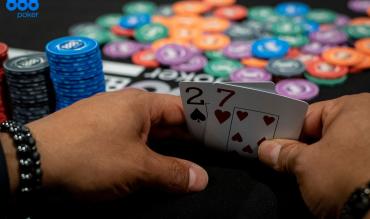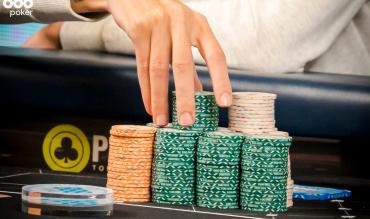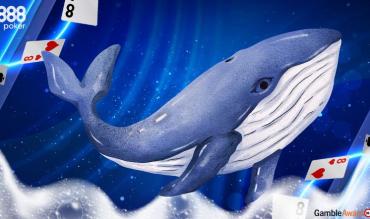Updated on March 19, 2025
What is a whale in poker? Simply put, a poker whale is extremely bad at the game. You'll often hear people using the term disrespectfully in place of fish or donkey, but there is a difference.
Though all three types of players are unpredictable, the whale tag applies more aptly to the biggest losers in poker.
Understanding these players can help you improve your strategy, whether you're still studying poker hands or learning advanced techniques.
Whale Poker - How to Spot and Identify Weak Players
The easiest way to spot a whale in poker is to observe their playing style and how many hands they participate in. Whales aren't used to winning, so they usually play poker to gamble and have fun rather than make a profit.
It’s hard to have fun from the sidelines, so whales play a lot of pots. Whether this is down to optimism or impatience, this liberal hand selection is one of the main reasons they lose so much!
Whale poker players don’t care about strategy or even learning how to play poker correctly. Even if they are aware of some tactics, they will typically choose to ignore them.

They don’t need a good reason to play a hand, either. They'll play hands like T2o because they read Doyle Brunson's book, 34s because it's their favourite hand, or 72o to win a side bet in strip poker.
Whales don't care about playing well, either. As far as they're concerned, strategy is for nerds, and GTO is a type of sports car.
Whales are immune to bet sizing. They have no concept of GTO poker, pot odds or equity and will chase draws regardless of bet size.
They came to have a good time, and since folding doesn't make many people's fun lists, whales often play as if their fold button broke.
Aggressive Poker Whale Types – How to Combat Them
Some whales in poker are stubborn and aggressive when they get frustrated or don't have a good hand. We don't mean aggressive in a violent, flipping-everyone-off kind of way, of course, but tossing out big bets and raises.

Although a strong player will do the same occasionally, good players tend to have strategic logic behind their aggression. But not a stubborn whale in poker. They will do it out of pride, YOLO or simply because ‘why not?’
A whale’s stubbornness makes sense. Being unfazed by losing a lot of money suggests that many whales are successful in life away from the table. Successful people are often competitive, disagreeable people, and poker variance is a badge of honour for them!
Aggressive whale poker players with big egos see folding as losing some kind of duel. Instead of tossing in the towel, they bully their way through a hand, trying to bet or raise their way out of trouble.
Whales are more likely to be aggressive when tilting or taking things personally at the tables, and poker hand probabilities go out the window. It's not uncommon to hear a whale declare war on another player after they got lucky.
Aggressive whales can be scary to play against because they aren't bothered by big pots and rarely slow down.
How Much Does a Whale in Poker Lose?
Becoming a whale isn’t like joining Mensa: There are no official criteria, entrance exam, or membership fee. As such, the loss amount to get the ‘whale’ tag is a matter of perspective.
It’s not just about money, either.
- A player who dusts off an average of $1 an orbit in a 10-handed $0.01/$0.02 game will lose less money than someone losing $4 per orbit at $200/$400 blinds.
- But we can only classify one of them as a whale.
- Stakes skew poker results, so losses can only be fairly measured by counting the number of big blinds lost (win/loss rate).
In modern poker, players losing at rates of 15bb/100 hands or more over substantial sample sizes are typically entering whale territory.
We can see why if we convert these two players’ win rates to big blinds per 100 hands, which is the standard way to measure this stat in poker:
- Player A: loses 50bbs every 10 hands = -500bbs/100
- Player B: loses 0.01bbs every 10 hands = -0.1bbs/100
Anywhere from 1-4bbs/100 is pretty damn good in poker. With that in mind, it’s easy to see why Player A is a whale but not Player B.
Since the value of money is relative, you’ll find whales at all stakes, chasing bad beat jackpots and the like!
It’s also possible for players to be winners at some stakes and whales at others since games get more challenging as you move up.
How to Beat Whale Poker Players
Whales in poker can be unpredictable, unlike nits or rocks, who have a typical play style. You’ll often see people going out of their way to play pots with the whale.
Although you should play a little looser, it’s crucial not to let your standards slip so much that you begin playing like a whale yourself.
To beat a poker whale, the first thing to consider is what kind of whale you are dealing with.

Versus Loose-Passive Whale Poker Players
If you are playing a loose-passive whale, they will not fold very often, so you shouldn’t try a poker bluff. The easiest way to beat them is to make a hand and value bet BIG.
Since whales usually call with any made hand, you should be more inclined to go for thin value bets, which is the poker term for betting with a slightly weaker hand than usual.
Against a whale, consider sizing up to 100-150% of the pot with the same hand you'd bet smaller with against regular players.
Versus Aggressive Whale Poker Players
The game plan is slightly different against aggressive whales. You should choose hands that flop well, like big cards, pairs, and suited aces. Since they will put a lot of pressure on you, this strategy will help you make hands that can stand the heat.
They will raise you a lot, too. So, avoid making thin value bets and being forced to fold. Instead, check more and give them a chance to bluff. Learning how to bluff in poker is essential, but against whales, it's often more effective to let them do the bluffing.
A practical approach is to tighten your opening ranges but loosen your calling ranges. This strategy keeps the pot manageable while capitalising on the whale’s tendency to overplay weaker holdings post-flop.
Why Poker Whales Are Essential – Respecting the Game

Players often use the term whale disrespectfully, but you should not do so yourself. Instead, make whales feel as welcome and valued as possible.
Whales are vital to the poker ecosystem.
Whales are recreational players who replenish the funds that leave the game in the way of admin costs, license fees and player withdrawals. Without these deposits, the games wouldn't survive.
Whales make the games easier, which helps a more significant proportion of players win. The digital poker landscape has transformed how whales operate. In online games, whales can now play anonymously, across multiple tables simultaneously, and at all hours of the day.
Modern poker tracking software has also changed the dynamic. Savvy players can quickly identify whales through statistical analysis rather than relying solely on observation.
Since many whales play poker to have a good time, respect them and ensure they have fun. This is advice that any of the greatest poker players of all time would take to heart.
After all, you'll win much more money with a whale at your table.
Originally published on June 3, 2019


